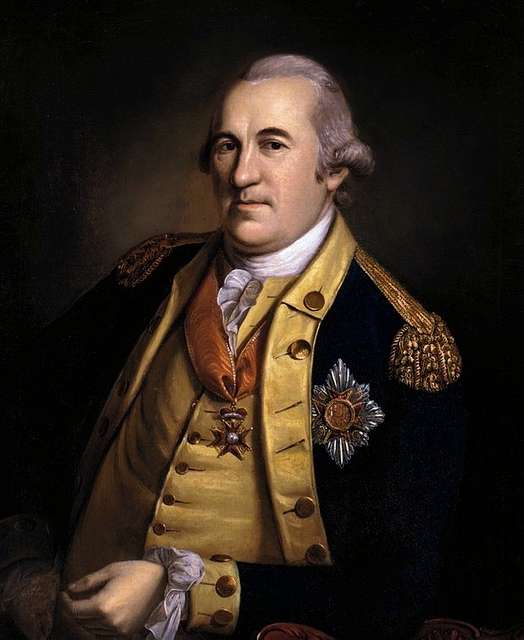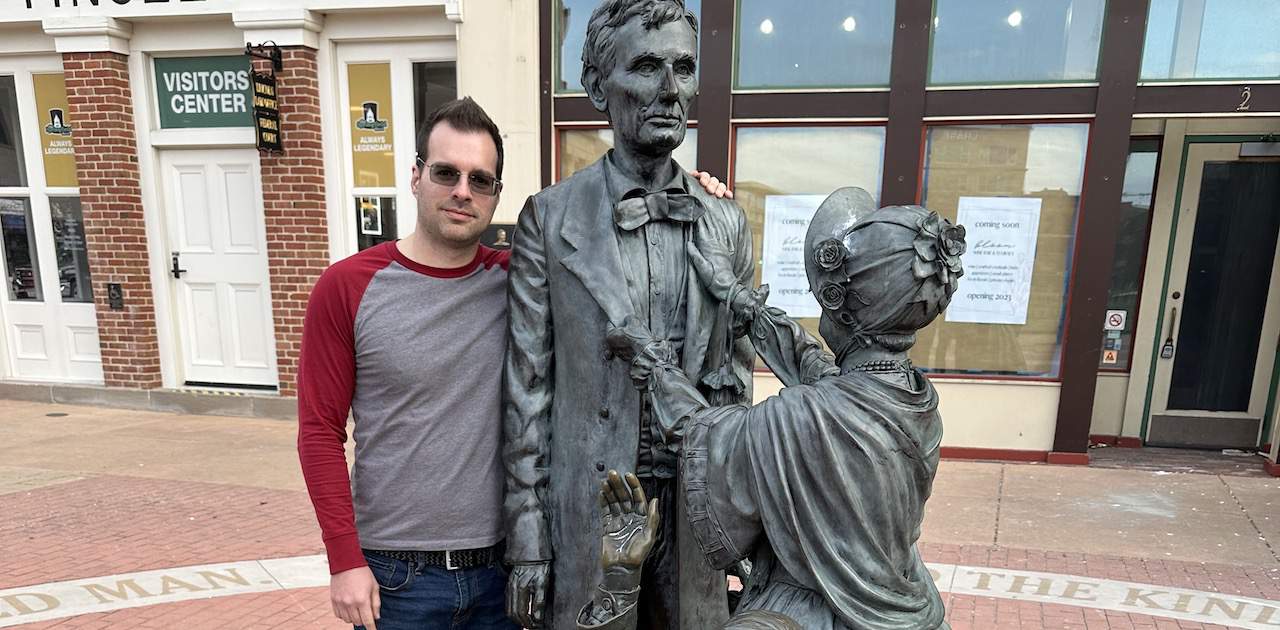Gay people have always been there. So why is there no mention of their sexual orientation in history? It’s because historians can rarely prove their sexual behavior, let alone their sexual orientation.
“But they’re just roommates!” is the refrain of a million history texts. Amid all the books about supposed historical figures, you’d think same-sex desire and gay relationships didn’t exist before 1945.
Sexual orientation has always been noticed — in their time
When General George Washington hunkered down at Valley Forge, his meager army had little training and few supplies. But one Prussian leader who came with the blessing of Benjamin Franklin sought to change that. A generous man, Frederick William Augustus Henry Ferdinand, or, “Baron von Steuben”, was sent by Franklin from Europe to train up Washington’s men.

Known today as the “Drillmaster of Valley Forge”, Baron von Steuben introduced a new professional identity among Washington’s men. He began training them with relentless drills, cannon operations, and musketry designed to prepare them for the rigors of battle. Drilling by the Baron ensured the soldiers reloaded their muskets and charged on command by muscle memory alone. All too often, men scattered into retreat when under heavy fire. They became terrified and lost their ability to act under immense pressure.
Baron von Steuben was, in many ways, an American hero and was well received by George Washington, who always remembered him long after the war. Baron von Steuben was also absolutely 100% gay.
The men in Continental Army camps noticed the Baron’s insatiable sexual appetite, particularly for younger men. Young men half his age came and went from the Baron’s tent at all hours of the night. General Washington turned a blind eye to this behavior, likely assuming it was some European influence or hoping no one noticed.
They noticed.
But, the Baron was a war hero, and we were broke and desperate, so no one cared. Or at least tried not to care. The Baron was too good and too necessary to be ignored or shunned.
We know the Baron was homosexual. No one denies it. It’s written in journals and diaries from the field, as well as in letters and correspondence to others. But as American history goes, his military service comes first, though several books about him do mention his gay sexual orientation.
Lincoln was gay, right? I mean, Mary Todd must have been a ruse, right?
LGBT people often assume homosexual people are washed out of gay and lesbian history. But the idea of homosexuality is relatively new. It’s critical to understand history through the lens of people in their time, not ours.
We often try to relate lessons or issues—like many love to do with the stoics or any story about Benjamin Franklin or Theodore Roosevelt. But the truth is: being gay doesn’t matter much to history. Honestly, it doesn’t matter much to the present, either.
Take George Washington again. Does it matter in the course of history what he liked for breakfast? Or what his favorite socks were? None at all. It had no bearing on his actions or impact on history. It helps us understand a little more about his personality, but that’s all.
Rumors have swirled for years about Abraham Lincoln supposedly being gay. His marriage to Mary Todd, the birth of his children, and years of correspondence to his wife when they were apart seem to account for nothing. Surely, many argue, Marty Todd must have been Lincoln’s beard.
The rumors center on Lincoln’s relationship with his “best friend” and “roommate” Joshua Speed. There are documented accounts of them sleeping in a bed when Lincoln and Speed shared a room in Springfield, Illinois, around 1837.
It’s easy for those of us in 2022 to look at two men sharing a bed and leap to the assumption they’re gay or at least undoubtedly had sex. But this accounts for a 21st-century look at a world very different from ours.
The future president and his best friend slept in the single bed they had access to. Beds were expensive in 1837, and the feathers and hay required to make pillows and mattresses were pricey and hard to come by. That’s why most cabins of the early American pioneers featured beds we’d consider a “twin” or “full” size today that were used by two people. Everyone else slept on the floor.
So when two young men with little money happened to have a bed between them, they slept on it because it was a precious resource. No different than if two people shared a meager ration of food when caught in the wilderness.
Maybe Lincoln was gay or bisexual. Maybe they did love each other romantically. But the evidence to support this doesn’t exist.
Eleanor Roosevelt’s love letters to Lorena Hickok proved she’s a lesbian, right?
Eleanor Roosevelt’s long effusive letters to her best friend Lorena Hickok indicate a deep love for one another. Eleanor Roosevelt may well have hidden her lesbian sexuality and married Franklin out of the necessity of needing to be married. But the evidence is scarce.
For much of American history, life on the farm or homestead required marriage for survival. You needed bodies (children) and someone to cook while someone else farmed and hunted. Those norms continued even after wealthy Americans like the Roosevelts no longer needed to marry for survival.
Eleanor Roosevelt’s letters do profess a certain kind of love that today we’d read with gender identity and a same-sex romance. But there is no definitive recorded instance of either woman engaging each other in a sexual or romantic relationship. Indeed, they might well have been. It can be comforting to think we’ve “figured someone out.” And we can feel a sense of remorse at their lack of gay pride and a sense of happiness at marriage equality that exists today. But conjecture and theory are all we’ll probably ever have.
No professional historian will account for anyone’s potential homosexuality when it can’t be proven.
James Buchanan was a bachelor, so, he’s gay, right?
Lincoln’s predecessor at the Executive Mansion, James Buchanan, has also been inferred to be gay because he never married. Maybe he was gay and he hid it from everyone around him in the federal government, but his sexual orientation is a mystery. Unlike Baron von Steuben, there is no recorded instance of someone seeing President Buchanan with another man.
The Civil War had begun under the presidency of James Buchanan. I’m not sure queer history wants to lay claim to him. Buchanan remains America’s only bachelor president who never married. He was also arguably America’s worst president since he failed to act when states started to secede. Under his watch, Fort Sumter was under siege, and the War Department began openly siphoning war materials to the south — all while Lincoln was on a train somewhere in New York on the way to Washington.
Language evolves, and it doesn’t fit with today’s norms or gender identity
Is George Washington a Republican or a Democrat? To think about this, you have to try and peg Washington’s various characteristics, thoughts, and views of issues of his day into their logical corollary today. But it’s impossible because the issues don’t match. Washington supported taxes and was not afraid of war. But so did Franklin Roosevelt. And Theodore Roosevelt for that matter, but T.R. was a progressive under the banner of “Republican.” You’d have to be pretty progressive to start a revolution, too, so where does that leave Washington?
A person’s actions 100 or 200 years ago don’t always align well with today’s norms and cultural values. Even relatively modern social movements like the Stonewall riots of thirty years ago struggle to match the rapid pace of change in the LGBT community today.
Homosexuality and heterosexuality are new concepts
The notion of “homosexuality” and “heterosexuality” are modern concepts in much of the world. Same-sex sexual and romantic acts have been around forever. Consider, too, that the Greeks and Romans famously conducted same-sex sexual acts toward one another, but they had no concept of an alternative.
Still, the idea that someone is either “straight” and thus “normal,” or “not straight” and thus “other” didn’t exist until the 20th century, mainly as a result of increased representation as homosexual men and women urbanized.
As gay people moved to the cities along with many other Americans and westerners, they formed a new identity in ways never before imaginable. Starting around 1900, gay people could discover people like them, often for the first time, even if they were still hidden and underground. Gay rights didn’t exist, but for them in the last several generations, neither did the idea someone in the Midwest frontier could hope to find another lesbian, gay, bisexual, or non-conforming person.
WWII accelerated this process and began to unleash opportunities in unthinkable ways for homosexuals. Men in drag acting as gender outlaws on Navy ships, the Army forcing young men together in tight, remote spaces, and long stretches of little contact with women or privacy will change a person’s views on gender identity and sexual orientation. The war forced men together in ways that seem “pretty gay” — even by modern standards.
Lesbians who came to cities — particularly amid staffing shortages during WWII — had less need to give birth than any prior generation of women. They showed the world their independence from men by taking on blue-collar jobs. These factory jobs helped many butch or masculine-forward women simultaneously show and hide their true identity. Many lesbians wore large keychains on their belts that showed they had the keys to their own homes, sheds, work units, etc. The “lesbian keychain” symbolized independent women who did not need — or desire — a man.
It’s worth noting trans women and trans men have also always existed. Cross-dressing, particularly the sort famously fancied by FBI head J. Edgar Hoover, followed a similar underground track. Society by and large was not ready for this, but pockets of openness began to open in cities like San Francisco and New York after WWII. These LGBT individuals proceeded to live lives more openly and show the world what was possible.
Retroactively, however, it’s unlikely the lives of prominent people will ever be re-labeled or declared “definitively gay.” Theory and assumption are all we’ll ever have — and that’s okay! People can hear the evidence and make their assumptions or guesses.
Society benefits when we understand the lives of those who came before us. But we must also recognize sexuality, like what someone enjoyed for breakfast, does not define them. It can make them more relatable or human to us, but it is not the most critical characteristic.

